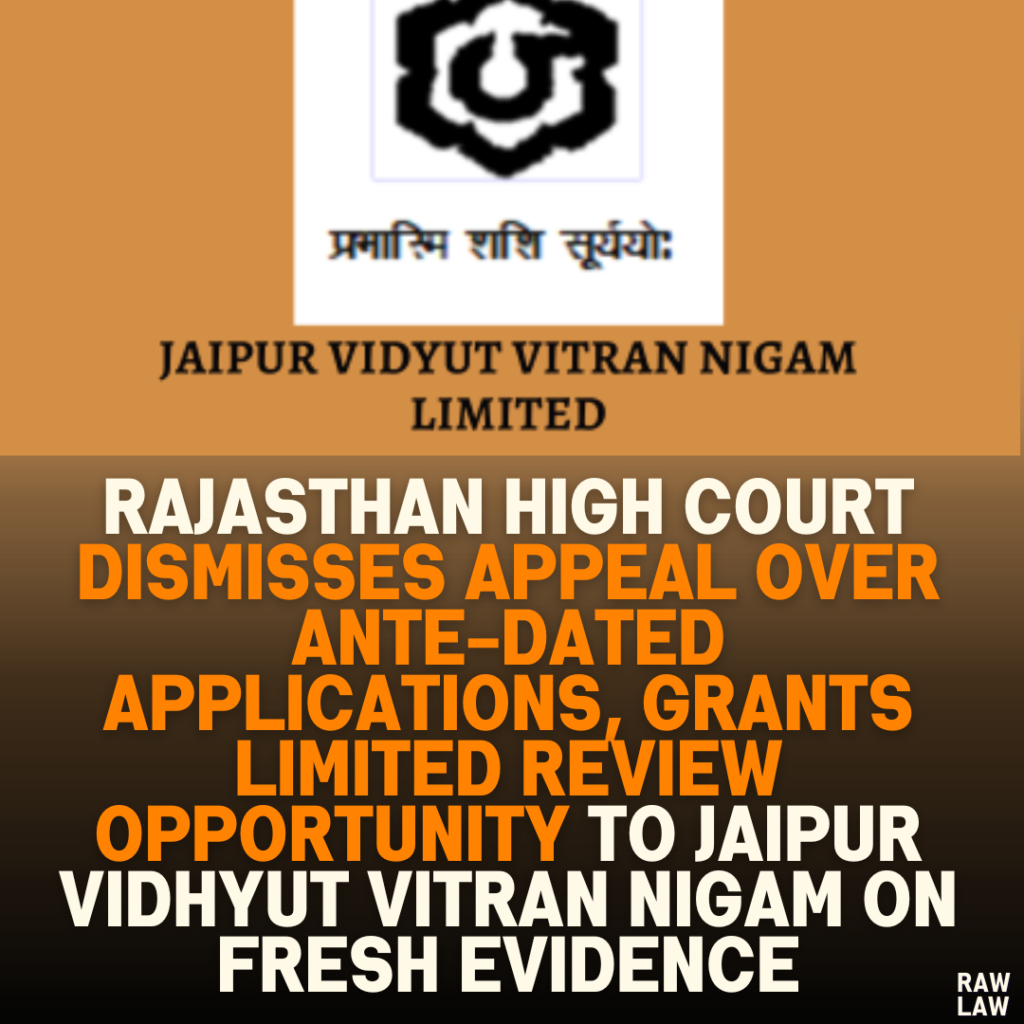Court’s Decision
The Rajasthan High Court dismissed the appeal filed by Jaipur Vidhyut Vitran Nigam Limited against a Single Judge’s order that rejected the allegations of employees submitting ante-dated applications. The court found no material evidence supporting these claims. However, it granted the appellants a limited opportunity to seek a review in the case of one employee, Purshottam, based on new evidence presented during the appeal.
Facts
The dispute revolved around allegations made by Jaipur Vidhyut Vitran Nigam Limited against several employees who were accused of submitting applications with manipulated dates to claim benefits they were not entitled to. The employees had previously worked as Helper-II in the organization. The allegations were investigated in a departmental inquiry, but the relevant records were unavailable during the proceedings before the learned Single Judge.
The learned Single Judge dismissed the allegations, citing the absence of evidence. The appellants then filed a Special Appeal before the Rajasthan High Court, arguing that the Single Judge had erred in dismissing their claims.
Issues
- Did the learned Single Judge err in rejecting the allegations of ante-dated applications due to the absence of records?
- Was the evidence presented during the appeal sufficient to warrant reconsideration of the case against Purshottam?
Petitioner’s Arguments
The petitioners (employees) contended:
- They had submitted their applications within the prescribed period.
- The allegations were based on missing and unsupported records, making the accusations unfounded.
- The appellants failed to discharge their burden of proving that the applications were ante-dated.
- The absence of departmental inquiry records further weakened the appellants’ case.
Respondent’s Arguments
The respondents (appellants) argued:
- The learned Single Judge incorrectly drew adverse inferences against the appellants due to missing inquiry records.
- It was incumbent on the employees to prove timely submission of their applications, regardless of the inquiry’s outcome.
- New evidence placed on record during the appeal indicated that Purshottam himself admitted to submitting his application beyond the prescribed time.
Analysis of the Law
The court evaluated the legal principles governing:
- Burden of Proof: The appellants, as the accusers, were required to substantiate their claims with evidence. The absence of inquiry records undermined their position.
- Adverse Inference: When key documents or records are missing due to the employer’s negligence, courts are justified in drawing adverse inferences against the employer.
- New Evidence: While appellate courts generally do not entertain fresh evidence, an exception was made in Purshottam’s case as the evidence was crucial and specific to the appeal.
Precedent Analysis
The court referenced established legal principles that place the burden on employers to prove allegations of employee misconduct. It noted that courts consistently draw adverse inferences when employers fail to produce critical evidence under their control.
Court’s Reasoning
- Against Most Employees:
- The court found no substantive evidence supporting the appellants’ claims that employees had submitted ante-dated applications.
- The appellants failed to explain why they could not produce the departmental inquiry records before the learned Single Judge.
- Regarding Purshottam:
- The court observed that Purshottam’s admission, which indicated a delayed submission of his application, was placed on record during the appeal but was not presented before the learned Single Judge.
- While criticizing the appellants for withholding this evidence earlier, the court considered it appropriate to grant a limited opportunity for review in Purshottam’s case.
Conclusion
The Rajasthan High Court dismissed the appeal concerning most employees, affirming the learned Single Judge’s order. It granted the appellants a limited opportunity to seek a review concerning Purshottam based on the newly presented evidence. The court emphasized that missing records significantly weaken an employer’s case and justify adverse inferences.
Implications
- Importance of Record-Keeping: The judgment highlights the criticality of maintaining and producing complete records during litigation. Employers risk adverse outcomes if they fail to do so.
- Review in Limited Cases: While appellate courts are reluctant to entertain new evidence, exceptions may be made when the evidence is significant and specific to a case.
- Burden of Proof on Employers: Employers alleging misconduct must present robust and timely evidence to support their claims. Missing records can severely undermine their position.
This judgment reinforces the need for diligence and accountability in handling administrative disputes and emphasizes the courts’ reliance on concrete evidence for fair adjudication. Let me know if further clarification is required!



